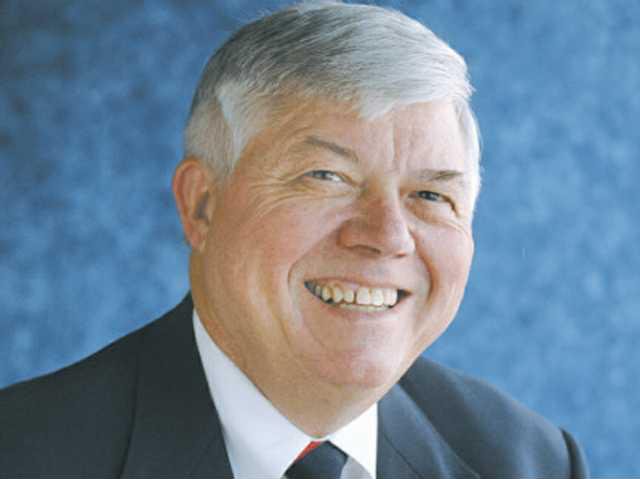Following Tuesday's student protest at Georgia Southern University regarding potential budget cuts to the state university system, "Mornings unPHILtered" guest, Georgia State Senator Republican Jack Hill, addressed those same budget concerns on Wednesday's show.
Hill serves Senate District 4, which includes the counties of Bulloch, Candler, Effingham, Emanuel, Evans, Tattnall, and Treutlen. He is also is the Senate Appropriations Committee Chairman.
Hill told host Phil Boyum the state has fallen behind in revenues each month over the past year, despite Gov. Sonny Perdue and legislators using the best economic forecast they could get, and yet now find themselves with a $1.7 billion budget deficit for the 2010 fiscal year, which ends June 30.
Worse, Hill said Perdue's current budget estimate has the state about $1.4 billion short and he expected Perdue to announce Wednesday a lowering of the revenue estimates, which is the bottom-line figure to which legislators must set the budget. To meet that lower figure, the governor will move about half of the remaining federal stimulus funds to cover the lost revenue, which will place an additional burden on the FY2011 budget.
The senator said the legislators cannot appropriate more than the governor's revenue estimate, so every drop in the estimate results in a reduction in the budget.
Hill said the governor has predicted three and one-half percent growth next year, and that unfortunately doesn't seem to be happening. The governor projects some $600 million worth of tax growth next year, but Hill said they would just have to wait and see whether or not the predictions are accurate.
State K-12 education funding takes up approximately 42 percent of the state's budget, Hill said, while publicly funded regular colleges and universities take up some 14 percent, and the technical colleges take up another two percent. This means that secondary and higher education account for some 58 percent of the entire state's budget for the year.
State cuts to K-12 education often result in local school systems raising their local property taxes and Hill said legislators are sensitive to that. This is why, he said, every state agency - including the board of regents - has been asked to cut their budgets by an average of 8 percent per year for the past two years, but K-12 education cuts have been kept between three to three-and-a-half percent per year over the same time frame.
Boyum asked Hill about the widely publicized cuts that might be made to Georgia Southern. Hill said the request for a proposal to cut an additional $300-million came from a sub-committee that is not at the decision-making level but was looking at a worst-case scenario.
The senator believes a series of miscommunications between the committee and the chancellor over faculty salaries at the University of Georgia caused such a ruckus around the state. The legislature, Hill said, has in the past allowed colleges and universities to make changes in fees, class sizes, and such in order to meet the cuts with and yet still provide a good education to students. He said he did not believe the percentage of university cuts would be much more than the percentage of cuts required by other state agencies.
Hill said that as chairman of the Appropriations Committee, the members have faced over the last several years a continuous decline in tax revenues. He said there are many hopeful signs of a beginning of an economic turnaround. Hill said that he didn't think that the final budget cuts to the university system this year would be more than 14 percent of the total cuts ultimately needed.
Also, Hill said that funds set aside for programs in the B Budget such as the 4-H program and the Extension Service cannot be used instead to fund the regular university budget items. He said the regents may have overplayed their hand since public outcry has galvanized support of those programs, which may make it difficult to cut them at all - even to the same level as other agencies.
Hill said some politicians have indicated that there are large amounts of unpaid taxes floating around in the business community totaling $1 billion. He discounts those reports thinks the state is collect the vast majority of collectible revenue, but in order to make sure he said the legislature has added new fraud investigators and auditors to become more efficient at auditing firms and making sure businesses are reporting correctly.
One thing Hill said he knows for sure is that the sales tax base did not grow with the economy, as the sales are now focusing on services and not physical goods. Hill said if the state expands the area of items taxed in the future to include things such as services, then future sales tax collections will grow with them.
Hill said that he and State Rep. Bob Lane have worked tirelessly to support the colleges in the southeast Georgia area, including GSU, and he assured area residents that Georgia Southern would continue to have the tools it needs to work with.
"Mornings unPHILtered" airs live Monday through Friday from 9 a.m. to 10 a.m. on statesboroherald.com and also simulcast on WWNS-AM 1240 on the radio. You also can listen anytime at BoroLive.com on statesboroherald.com
Hill: Budget cuts affect all
State senator expects university cuts will not reach $300 million


Sign up for the Herald's free e-newsletter